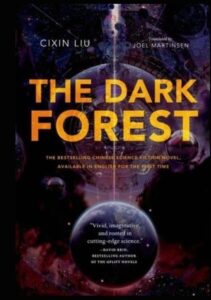A BOOK REVIEW BY SOHAM GUHA

Remembrance of Earth’s Past Book II
When we look at the night sky, two things occur to a person. Either we feel small before the baleful and distant lights, or we feel we are the center of all things. Carl Sagan once said that astronomy was a humbling and character-building experience. His words had stemmed from years of studying the lights of these distant stars and how far away were they in this grand cosmic arena, how insignificant were their lights despite their monstrous sizes. Carl Sagan’s idea of our universe was based on information, not speculation. And in those early and glorious years of the Space Age, information was finite but mankind’s ambition was limitless. We thought we were destined for greater things.
When we pointed to our massive radio telescope to hear the hymns of the universe, we were baffled. We asked, “Why is it so quiet out there?” There are many hypotheses regarding this quietness of the cosmos. Some astrophysicists had considered anthropogenic explanations for the Fermi Paradox, that we are either too early or we are too late. We are alone in this cosmic darkness. However, life as we know it, ‘finds a way’. If it found its way into this world, what stopped it from emerging in other worlds as well?
Then there is the Dark Forest Hypothesis. Unlike other theories, this hypothesis was not considered by astrophysicists, philosophers, or academics, but by a science fiction author: Cixin Liu. It is also his sequel to The Three-Body Problem.
The novel picks up the immediate breadcrumbs left by its predecessor. “Part I” of the book is a slow read, and can make any reader of English literature feel underwhelmed, wondering if this book is truly written by the same author who delivered an explosive climax just a book ago. The narrative of “Part I” is slow, meandering without progressing the plot further. The novel starts truly when it enters “Part II” and the final pages of the book, like Three-Body Problem, was also amazing. And, in my humble opinion, even better.
The Dark Forest encourages readers to embark on a journey with the reader, and explore the deaths of human nature. Because of this, and the realistic approach undertaken by Liu, certain things become clear why they exist. Firstly, ‘part I’ acts as not as an explosive beginning but a humble one, where the protagonist is just another common man, yet to become a ‘hero.’ Because of this, we see him as a person like us, and we relate with him as well. Only the cascading unfolding of certain events put him on his path in the later part of the narrative.
As Liu depicts Chinese culture as it is, male characters are given more attention than females, while as older characters are important ones in the narrative, not the younger ones. This emphasis on certain types of characters is not gender or age bias, but a true representation of the Chinese culture as it is.
Then there are the sentient protons, the sophons, spying on humanity, halting our technological advancement. And it all takes the selfish destructive mindset of an individual to remind the Trisolarans that this world is turned into dust before turning into their colony.
The only thing humanity required to execute self-annihilation was to scream. The universe is watching. It is a hunting ground.
The “dark forest” notion is one of the primary philosophical topics examined in “The Dark Forest.” According to this hypothesis, civilizations in the cosmos must stay hidden and silent, much like animals in a dark jungle, for fear of drawing the notice of other possibly hostile and more evolved civilizations. This notion raises philosophical problems regarding the nature of communication, the balance between secrecy and inquiry, and the implications of disclosing one’s existence to the unknown.
The question of humanity’s role in the cosmos is another important philosophical issue in the book. Characters in the novel are confronted with the immensity and indifference of the cosmos as they cope with the knowledge of the Trisolaran civilization and their coming invasion. This causes reflection on human importance, the meaning of life, and the possible boundaries of human knowledge and comprehension.
Liu Cixin also discusses morals, ethics, and the nature of power. The novel’s characters encounter difficult decisions and obstacles as they navigate Earth’s complex political system and the impending threat of the Trisolarans.
However, this book is not translated by Ken Liu, the translator of the previous novel, and also the succeeding novel called Death’s End. Joel Martinson, despite his commendable grasp of the language, at times appears lost or simply awkward line-by-line translation of the original text, where the subtext value of the prose is lost.
Science Fiction, like the other sub-genres of speculative fiction, incorporates the social, economic, psychological, physiological, philosophical, and political nature of the current human paradigms, and interprets the alternative representations of them in a believable context. The Dark Forest is our reaction to a looming alien invasion threat, our fear, the shift of our moral core, and the expectations we impose on ourselves in the name of survival.
Finally, The Dark Forest is a reminder that there are malevolent things hiding in the darkness of the universe, and that there always bigger, famished fish in the ocean.
“The universe is a dark forest. Every civilization is an armed hunter stalking through the trees like a ghost, gently pushing aside branches that block the path and trying to tread without sound. Even breathing is done with care. The hunter has to be careful, because everywhere in the forest are stealthy hunters like him. If he finds other life—another hunter, an angel or a demon, a delicate infant or a tottering old man, a fairy or a demigod—there’s only one thing he can do: open fire and eliminate them. In this forest, hell is other people. An eternal threat that any life that exposes its existence will be swiftly wiped out. This is the picture of cosmic civilization. It’s the explanation for the Fermi Paradox.”
To know about the Dark Forest Hypothesis, watch this.
Also read, The Three Body Problem, a book review by Soham Guha and published in The Antonym:
Follow The Antonym’s Facebook page and Instagram account for more content and exciting updates.


























0 Comments